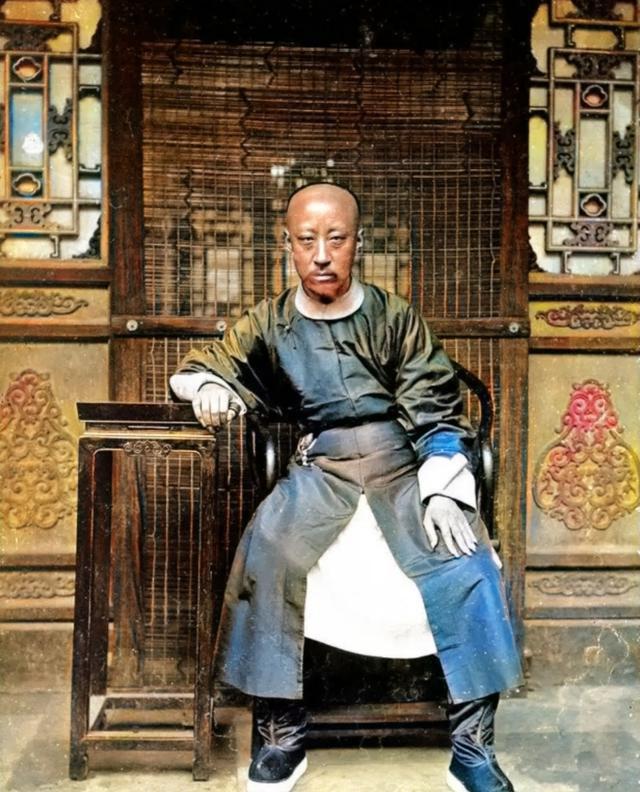In 1869, a photographer from Scotland used his camera to capture a group of historical images of Qing officials.

The one in the photo is the famous Devil Six, the sixth son of the Daoguang Emperor, the half-brother of the Xianfeng Emperor Ai Xinjue Luo Yi.
After the death of the Xianfeng Emperor, Empress Dowager Cixi and Empress Dowager Ci'an launched the Xin You coup d'état with his help to seize power, and later Empress Dowager Cixi deposed Yi in 1865 in order to take power alone.
In the photo is Shen Guifen, the Shangshu of the Bingbu, whose ancestors were wujiang people in Jiangsu, born in 1818 in Wanping, Shuntian, who was admitted to the Jinshi in the twenty-seventh year of Daoguang, served as a cabinet scholar and ceremonial attendant during the Xianfeng period, and had been promoted to the military aircraft department during the Tongzhi period, and he was also one of the main figures in the late Qing Dynasty foreign affairs movement.
Holding a fan and smoking a large cigarette bag is Hubu Shangshu Dong Ke, whose ancestral home is in Ganquan, Jiangsu Province, and he has been all the way up the road since he entered the army during the Daoguang years, and during the Tongzhi period, he also served as an errand boy in the prime minister's affairs of various countries who dealt with foreigners, and also went to Britain, the United States and other countries to sign trade treaties, and he can also be regarded as an official who has seen the world in the late Qing government.
In the photo is Mao Changxi, a rebbe attendant, who was promoted to the imperial court as an official in the imperial examination during the Daoguang years, and later held regimental training, participated in the campaign to suppress the Twist army, and was later awarded the official position of Rebbe Waiter because of his outstanding military achievements during the suppression of the Twist army.
In the photo is ruilin, the governor of Liangguang, who was born in Manchuria's Zhenglan banner, although this person has always served as a civilian official, but his appearance looks heroic, quite a kind of martial arts people's momentum.
He served as a young secretary of the Taichang Temple, a cabinet scholar, a rebbe attendant, a military aircraft minister, a Tobe waiter, a rebbe Shangshu, a Hubu Shangshu, a viceroy of Liangguang, and a scholar of Wenyuange University, and after his death, he was posthumously awarded the title of Crown Prince Taibao.
These three people are Cheng Lin, Wen Xiang, and Bao Zheng, the prime minister.
Born in Manchuria with a white flag, Cheng Lin served as an official during the Xianfeng Emperor's reign, and was later transferred to the post of prime minister Yamen because he was appreciated by Prince Gong Yixin.
Born in Zhenghongqi, Manchuria, Guarjia Wenxiang entered the priesthood in the 25th year of Daoguang, and after entering the DPRK as an official, he successively served as the chief of the Ministry of Works, the Cabinet Bachelor, the Attendant of the Punishment Department, and the Minister of Military Aircraft.
He was also appreciated by Prince Gong Yixin, and was highly valued by Prince Gong after Empress Dowager Cixi launched a coup d'état with Prince Gong.
Born in Manchuria with a white flag, Bao Zheng entered the priesthood in the eighteenth year of Daoguang, and later served as the head of the ceremonial department, the cabinet scholar, the right attendant of the ceremonial department, and the minister in charge of the interior.
In the photo is He Weijian, then the Hankou Daotai, who in the Qing Dynasty was a Sipin official position, which was already a local official, and this Daotai also wore a pair of glasses, which was rare among officials at that time.
This was also an official of the Qing Dynasty, and he was not recorded in detail in the original photograph at that time, so it is difficult to identify the official position and name of this person.